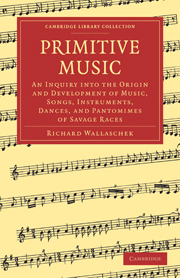 Primitive Music
Primitive Music Book contents
- Frontmatter
- PREFACE
- Contents
- CHAPTER I GENERAL CHARACTER OF THE MUSIC OF PRIMITIVE PEOPLE
- CHAPTER II SINGERS AND COMPOSERS IN PRIMITIVE TIMES
- CHAPTER III INSTRUMENTS
- CHAPTER IV THE BASIS OF OUR MUSICAL SYSTEM
- CHAPTER V PHYSICAL AND PSYCHICAL INFLUENCE OF MUSIC
- CHAPTER VI TEXT AND MUSIC
- CHAPTER VII DANCE AND MUSIC
- CHAPTER VIII PRIMITIVE DRAMA AND PANTOMIME
- CHAPTER IX ORIGIN OF MUSIC
- CHAPTER X HEREDITY AND DEVELOPMENT
- Summary
- List of quoted Authorities
- Index
- Plate section
CHAPTER VI - TEXT AND MUSIC
Published online by Cambridge University Press: 29 August 2010
- Frontmatter
- PREFACE
- Contents
- CHAPTER I GENERAL CHARACTER OF THE MUSIC OF PRIMITIVE PEOPLE
- CHAPTER II SINGERS AND COMPOSERS IN PRIMITIVE TIMES
- CHAPTER III INSTRUMENTS
- CHAPTER IV THE BASIS OF OUR MUSICAL SYSTEM
- CHAPTER V PHYSICAL AND PSYCHICAL INFLUENCE OF MUSIC
- CHAPTER VI TEXT AND MUSIC
- CHAPTER VII DANCE AND MUSIC
- CHAPTER VIII PRIMITIVE DRAMA AND PANTOMIME
- CHAPTER IX ORIGIN OF MUSIC
- CHAPTER X HEREDITY AND DEVELOPMENT
- Summary
- List of quoted Authorities
- Index
- Plate section
Summary
In the relation of text and music there seems to have been little change from time immemorial. It would be just as difficult to characterise in general the mutual position of both in the songs of savages, as it is to-day to arrive at a satisfactory solution of the question as to the rank of poetry and music when united in a single art-work. All depends upon the quality of the text, and in primitive times upon the development of language as well.
The most striking feature of all the savage songs is the frequent occurrence of words with no meaning whatever. This we have found in the choral songs of the Bushmen, and sometimes in those of the Kafirs, although the latter also possess some solo songs with a definite subject.
The songs of the Todas (Nilgiri Hills) are unlike those of other hill tribes usually devoid of any signification, or if they have a meaning at all they refer merely to events of recent occurrence. The Todas speak a peculiar dialect that has given rise to all sorts of mysterious hypotheses as to their origin. According to Mr. Metz, however, they do not speak a language peculiar to themselves; it is only their pectoral pronunciation which produces that apparent dialect. The great national songs of the Kamchadales are called Bachia, a word the constant repetition of which constitutes the whole of the song.
- Type
- Chapter
- Information
- Primitive MusicAn Inquiry into the Origin and Development of Music, Songs, Instruments, Dances, and Pantomimes of Savage Races, pp. 170 - 186Publisher: Cambridge University PressPrint publication year: 2009First published in: 1893
